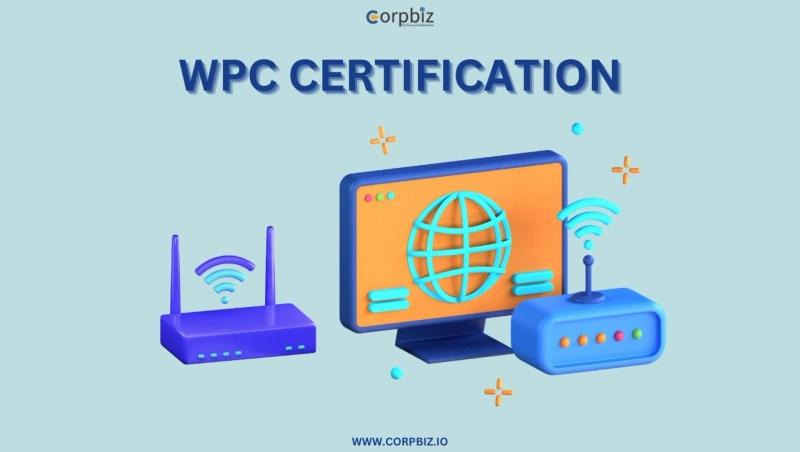The impact of WPC certification on IoT and smart devices in India is a topic of growing importance as our reliance on connected devices increases. As entrepreneurs and startups explore opportunities in the ever-evolving tech industry, understanding the regulatory framework for these devices is essential. Ensuring compliance with India's regulatory requirements not only enhances credibility but also fosters trust among consumers.
What is WPC Certification?
WPC Certification, issued by the Wireless Planning and Coordination (WPC) Wing of India’s Department of Telecommunications, is a mandatory requirement for devices using wireless technology. This includes Bluetooth devices, Wi-Fi-enabled gadgets, and IoT solutions. Without proper certification, businesses risk facing legal hurdles and losing market opportunities. WPC ETA Registration is the process through which manufacturers or importers obtain Equipment Type Approval (ETA) for devices that operate on de-licensed frequency bands.
Why WPC Certification Matters for IoT and Smart Devices
The Internet of Things (IoT) has become a cornerstone of modern technology. From smart home devices to industrial IoT applications, these devices rely heavily on wireless communication. WPC certification ensures that these devices comply with Indian standards, safeguarding users from potential interference or safety issues. Compliance with WPC Registration Online not only ensures legal operation but also reflects the manufacturer’s commitment to quality and reliability.
TEC Certification: A Complementary Requirement
While WPC certification is essential for wireless devices, the Telecommunication Engineering Centre (TEC) plays a complementary role in certifying telecom equipment. TEC certificate registration ensures that the devices meet Indian telecom standards, addressing concerns like network compatibility and safety. For IoT devices that interact with telecom networks, obtaining both TEC Registration and WPC certification is crucial to ensure seamless integration.
Challenges Faced by Startups and How to Overcome Them
Startups often struggle with the complexities of regulatory compliance, especially when navigating the technical requirements of certifications. Lack of awareness about WPC ETA Registration or TEC certificate requirements can delay product launches and increase costs. Here’s how we can tackle these challenges effectively:
- Understand the Regulations: Familiarize yourself with the certification process, including WPC Registration Online and TEC certificate registration, to avoid unnecessary delays.
- Leverage Expert Assistance: Consult professionals or agencies that specialize in obtaining these certifications. They can streamline the process and ensure that all requirements are met.
- Plan Early: Begin the certification process during the product development phase to save time and resources later.
Benefits of WPC and TEC Certification for Businesses
Acquiring WPC certification and TEC Registration provides several benefits:
- Market Access: Compliance enables us to legally sell our IoT and smart devices in India.
- Consumer Trust: Certified devices instill confidence among users, enhancing brand reputation.
- Competitive Edge: With proper certifications, we can differentiate our products in a crowded market.
- Regulatory Compliance: Avoiding penalties or legal issues by adhering to Indian guidelines.
The Role of WPC Certification in Promoting Innovation
India’s regulatory framework, including WPC certification, is designed to foster innovation while maintaining safety and reliability. By complying with these standards, startups and entrepreneurs can focus on developing cutting-edge IoT and smart devices that align with global trends. WPC ETA Registration not only ensures operational legality but also positions Indian businesses as credible players in the global market.
How to Get WPC Certification and TEC Registration
Navigating the certification process may seem daunting, but with the right approach, it becomes manageable.
- Understand the Requirements: Identify whether your device requires WPC certification or TEC Certificate registration. Devices operating in de-licensed frequency bands usually require WPC ETA Registration, while telecom-related devices need TEC Registration.
- Prepare Documentation: Compile all necessary documents, including technical specifications, test reports, and business details.
- Apply Online: Submit your application for WPC Registration Online or TEC Registration through the respective portals.
- Testing and Approval: Devices may undergo testing to ensure compliance with standards. Once approved, certifications are issued.
Future of IoT and Smart Devices in India
The Indian IoT market is poised for significant growth, driven by advancements in technology and increasing consumer demand. As startups and entrepreneurs, we must prioritize regulatory compliance to seize these opportunities. With the backing of WPC and TEC certifications, our devices can reach broader audiences, ensuring sustainable growth and innovation.
By embracing compliance and understanding its impact, we can not only protect our businesses but also contribute to a robust and trustworthy ecosystem for IoT and smart devices in India. The journey may involve challenges, but the rewards—market access, consumer trust, and long-term growth—are well worth the effort.
FAQs
1. What is the validity of WPC certification in India?
WPC certification is typically valid for the product’s lifecycle, as long as there are no modifications to its technical specifications.
2. Can startups apply for WPC Registration Online themselves?
Yes, startups can apply for WPC Registration Online through the official portal. However, hiring experts may simplify the process.
3. Is TEC certificate registration mandatory for all IoT devices?
TEC certificate registration is required for IoT devices that interact with telecom networks or involve licensed frequency bands. Always check specific requirements for your product.


